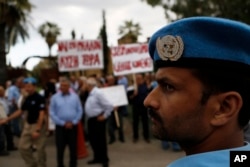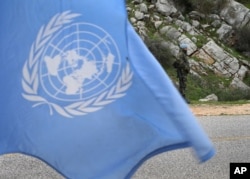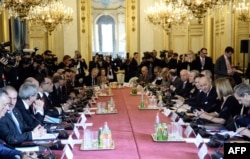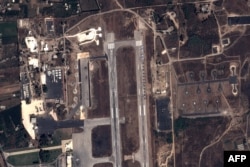U.S. President Barack Obama arrives at the United Nations on Sunday for several days of meetings, speeches and summits.
Among them, he will chair two high-level sessions -- one on U.N. peacekeeping and the other on countering terrorism. He is also expected to meet with Russian President Vladimir Putin.
The peacekeeping summit will take place Monday and will be co-hosted by the United States, eight other nations and U.N. Secretary-General Ban Ki-moon.
“Our intense focus is rooted in recognition of the fact that the need for nimble, effective U.N. peace operations has never been greater,” said Sheba Crocker, U.S. assistant secretary of state for international organization affairs.
The United Nations has more than 120,000 troops and police deployed in 16 missions around the world at a cost of over $8 billion a year.
Recently, they have come under increased scrutiny because of more than a dozen allegations of sexual abuse and exploitation committed by peacekeepers against women and children, mainly in the U.N. mission in the Central African Republic.
UN peacekeepers
Nearly all the U.N.’s peacekeepers come from countries in the global south. European countries used to be more active in peacekeeping, but with NATO’s involvement in Afghanistan starting in 2003, their participation waned.
Now, the trend is reversing. Some nations – like Sweden and the Netherlands – are sending troops and equipment to Mali, where the U.N. has a complex mission that often has to cope with attacks from al-Qaida-linked terrorist groups in the country’s north.
One senior U.N. official said it is not so difficult to recruit peacekeepers -- but rather to find ones who are well-equipped and trained.
The official said that situation is starting to turn. “It so happens many of those countries are precisely ready to [contribute] anything from staff officers, intelligence specialists, engineering units, field hospitals.”
The U.N. is also hoping for commitments of perpetually scarce helicopters and the crews who can operate them.
Crocker said the U.S. hopes there will be important announcements at Monday’s meeting.
“We expect some 50 participating nations to join us at the summit, and we anticipate announcements of significant commitments coming in categories such as aviation, infantry, police, and other mission support," Crocker said.
US capabilities
She said Obama would also make an announcement about American contributions, which would be “aligned to our particular capabilities."
Traditionally, the U.S. does not send troops but does pay nearly 30 percent of the U.N. Peacekeeping’s $8 billion annual budget.
Last week, the U.S. and India announced they would jointly train troops from six African countries before they deploy with U.N. missions.
Japan is also expected to announce broader involvement, as it moves toward relaxing post-World War Two laws prohibiting their forces from fighting abroad.
U.N. Peacekeeping Chief Hervé Ladsous said the organization needs everyone.
“The fact that we are going to have almost 50 countries who are going to commit – or recommit – on Monday, I think is a huge leap forward. And I think a great opportunity to both broaden and deepen the base for peacekeeping contributions," Lasdous said.
Countering terrorism
On Tuesday, Obama will chair a summit on countering the Islamic State militant group and violent extremism.
It is a follow-up to a U.N. Security Council session he chaired last September on stemming the flow of foreign terrorist fighters and a White House summit in February on countering violent extremism.
There are now about 60 countries in the anti-Islamic State coalition.
Source of suffering
U.S. Secretary of State John Kerry said Sunday that “extremist violence” is a major source of the suffering for people in Syria and elsewhere in the Middle East, sending thousands of them in search of safe havens in Europe.
The top U.S. diplomat told the Global Counterterrorism Forum in New York that Islamic State insurgents are “a primary source of outrage.” But he also named al-Qaida, al-Shabab, Boko Haram and Lashkar-e Tayyiba as terrorist groups that have posed “an enormous burden on front-line states.”
He said that while the flashpoints may vary from country to country, “to defeat terrorism, we have to act globally and locally.”
Kerry said the world’s nations must curb the recruitment of terrorists.
He said a new initiative is aimed at giving “vulnerable governments” the know-how to prevent “radicalization in the first place” and to successfully reintegrate those who have become radicalized into their communities.
As far as Obama's meeting Tuesday, U.S. Ambassador to the U.N. Samantha Power said, "The president is going to convene a meeting to look at countering violent extremism, to look at what the coalition has achieved and where the gaps are."
Meeting with Putin
There has also been a lot of speculation around Monday’s meeting between Obama and Russian President Vladimir Putin.
The two leaders have not met in months, as the U.S. seeks to diplomatically isolate Moscow in retaliation for its annexation of Crimea.
Putin recently bolstered military support to his ally President Bashar al-Assad in Syria, and has proposed creating a new international coalition to fight the Islamic State group that would include Assad and Iran.
“I think we will see Putin use his U.N. appearance to flesh out the idea of this grand coalition, which somehow is going to include Assad, and he will marry that with a diplomatic initiative to promote a political solution,” said Andrew Weiss of the Carnegie Endowment for International Peace.
“It is hard for me to imagine many regional actors jumping at this opportunity to join forces with the Russians," Weiss added.
Russian forces
One Security Council diplomat summed up Western concerns about Moscow’s military build-up in Syria, saying “If the Russian military that are now in Syria are there in order to fight Syria as part of an anti-ISIL coalition, that’s going to be one thing. If they are there in order to militarily shore-up a weak and failing Assad regime, then that’s another. And we don’t know yet.”
The diplomat used an acronym for the Islamic State group.
Washington has already dismissed Moscow’s efforts to negotiate a Security Council presidential statement on countering the Islamic State group for a competing counterterrorism meeting Russia’s foreign minister plans to chair on Wednesday.
Crocker, of the State Department, said: “We have concerns that a council presidential statement could be perceived as endorsing an approach that could set back efforts to reach a negotiated political transition in Syria, and it is at significant variance with the on-going efforts of a coalition of more than 60 countries, including all of Syria’s neighbors, to counter ISIL."








